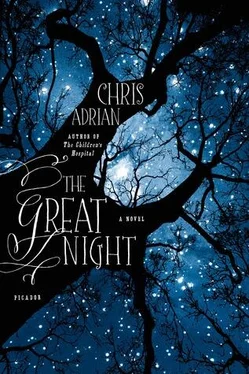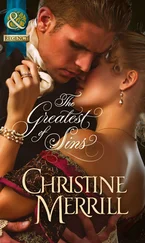“What’s that noise?” Henry asked.
“Music. Come along. Come away. We are so much the same, you and I!” He walked faster now, dragging Henry along the path, which ended suddenly at a flat stretch of grass, soft and oddly warm under Henry’s feet. The grass ran up to a dark expanse of rock, where even as they looked at it a door was opening in the side of the hill. Light spilled out onto the grass, along with a louder noise of bells and laugher.
“I don’t want to go in there,” Henry said.
“Yes, you do,” the dog said. “You have always wanted to go in there.” Henry looked back again, but there was nothing to be seen of the city, just grass and trees and flickering lights in the darkness that he didn’t think were cigarettes anymore. He was already forgetting what he was supposed to be getting back to beyond the trees, but he still pulled one more time. The dog led him into the light and the music and Henry went along, experiencing the curious sensation that he himself was a bell and that he was starting to ring in sympathy with the music he heard. The light became brighter and brighter, until he couldn’t see anything anymore, but he could hear, amid the laughter and the bells, a rising cheer.
Henry said he didn’t need anybody to teach him how to ride a bike or deliver a message or a package, but Mike made him Ryan’s student anyway. “You listen up, Bubba,” Mike said, putting a “Mike’s Messengers” hat on Henry’s head and turning it around on his head a few times before he settled on a position, cocked a few degrees west of Henry’s nose. “You’ve got talent, but baby boy here has got skills.” He waved goodbye to them from the tall stoop of the house on Fourteenth Street, standing there until the last of the boys had pedaled away with a roomy messenger bag slung around his shoulders and neck, empty except for one of the sandwiches that he made the night before, carefully folding lettuce and cutting away crust, and wrapping each one lovingly in wax paper, upon which he wrote the day’s motto, a different one for everybody. “Are we taking these somewhere?” Henry asked, reading his sandwich: You are just as special as you think you are. Ryan said, “Just try to keep up.”
That wasn’t hard. Henry’s legs were not as strong as Ryan’s, but his bike was light and fast, and though it never turned into a pony again, he didn’t always have to pedal it to make it go uphill, and Ryan took him up some big ones. They went up Steiner and passed within view of Buena Vista Park. “Don’t look at it,” Ryan called back, but he stared too at the pile of trees at the top of the hill, and barely missed wrecking when a man opened his car door in front of him. “Asshole!” Ryan said, and pedaled away furiously up the steepening hill. He spared no attention for Alamo Square Park, though Henry almost paused to admire the giant cypresses and galloping dogs. When he stopped at last in front of a huge house on the corner of Broadway and Steiner, Henry couldn’t tell if Ryan was pleased or displeased at how well he kept up. He seemed to be both smiling and scowling. “Wait here,” he said, and left Henry on the front walk with the bikes while he hopped over a garden wall and disappeared around the side of the house. Henry wondered if he was supposed to ring the bell, and if Ryan had something in his bag to deliver here. He looked around. A sparrow rose from the garden and flew into an open window on the side of the house.
Shortly after that Ryan opened the front door. “Come on,” he said, after he had put the bikes behind a bush. “Nobody’s home,” he said. “I’ve been watching to know when they come and go. You’ll learn how to do that.”
“How’d you get in?” Henry asked, looking around at the marble foyer and the fancy chandelier.
“You know how,” Ryan said, and started up the stairs. “You can do it too. You just have to remember.”
“Remember what?” Henry said. But Ryan was gone; a gray cat was racing silently up the stairs. “Remember what?” Henry said again, running up the stairs and stopping at the top. A long carpeted hallway went left and right. Henry walked to an open door at the end into a cavernous bedroom. Ryan was rifling through the drawers. “I’ve been in this house before,” Henry said.
“No, you haven’t,” Ryan said. “That’s just you trying to remember the wrong thing.” He shook his bag at Henry. “Come on,” he said. “Fill ’er up.” Henry went farther into the room, into an alcove off the bathroom, and sat on a plump velvet stool in front of a gold and white table. He looked through the drawers. They were full of makeup and jewelry. “Look at this,” he said, holding up a heavy diamond necklace.
“Too fancy,” Ryan said. “It needs to be stuff Mike can sell at the shop.”
“Shop?”
“I’ll show you. Keep looking.” Henry put the necklace on and looked at himself in the mirror. A wave seemed to pass over the glass, and he looked away, down at the surface of the table, and picked up a brush and smelled it. That made him think of his mother, and how she always said she was going to put on her face when she did her makeup. It made Henry believe when he was very small that her face was detachable, and he had always hoped and feared she might take it off for him. Without Ryan telling him so, he knew he was remembering the wrong thing, and he looked up again at his face. This time he saw the wave move across it, though he didn’t feel a thing. The mirror cracked.
“You’re useless!” Ryan said. “We’re not here to break stuff.” He came over and started emptying the drawers of their jewelry and told Henry to take off the necklace. But he only hid it beneath his shirt.
Henry’s bag was only half-filled when Ryan said it was time to go. He told Henry to stuff underwear around the watches and bracelets and earrings to keep them from jingling and then criticized him for using too much packing. “We’re not here to steal underwear,” he said. They left through the front door and rode away on the bicycles.
The stealing didn’t particularly bother Henry. He had stolen things before; he remembered putting candy and paperback books down his pants once at a drugstore on a shopping trip with his mother. He hadn’t really been hungry for candy, and the book, an overheated romance novel, had been interesting only because the man on the cover was wearing a kilt and no shirt. He had taken the things just for the sake of taking them, to see if he could do it. He couldn’t remember if he stole often or never again after that, and either way it didn’t matter now. The whole day had collapsed into this pedaling moment; the morning and the evening felt so far away he was sure they had never happened and would never happen. And his priorities had collapsed so that only a few things mattered: his bicycle, his new friend, and one other thing he could not quite name. He was smiling as they coasted down into the Marina, crossing Lombard Street just as the light was changing and swerving through the traffic. “What are you so happy about?” Ryan called back, and Henry said he didn’t know.
They went to the beach, leaving their bikes at the edge of a cliff in the Presidio and scrambling down a crumbling path that wound through small groves of eucalyptus and patches of waist-high purple flowers. Henry slid the last fifty feet and ended up on his back in the sand. Ryan skated over the same fall of rock and sand, throwing his arms out like a ballerina and landing lightly at Henry’s feet. He dropped his bag and told Henry to do the same thing. Henry asked if they wouldn’t be stolen, though they were in an isolated cove and the stretch of beach was empty except for them.
“Come on,” Ryan shouted. “This is important!” He took off running. Henry chased him down to the water. “Come on!” Ryan shouted again, not turning around to say it, but Henry heard him very clearly. “Come on!” Henry almost had him — he reached to grab the edge of his shirt and pull him down into the water — and then he was gone. A sleek tan greyhound was running in his place. When Henry tripped, he thought at first it was out of surprise, but he understood as he fell that what felt like surprise — swift, sudden, and shocking — was actually delight, and he was glad he had tripped, because the little accident seemed to provide the momentum he couldn’t provide for himself. He fell forward and felt at last that he had caught up with his friend. A wish was a change: a boy fell and rolled in the shallow heaving surf, but a dog straightened himself out. A black Lab in a diamond necklace shook out its fur and took off after the greyhound.
Читать дальше












